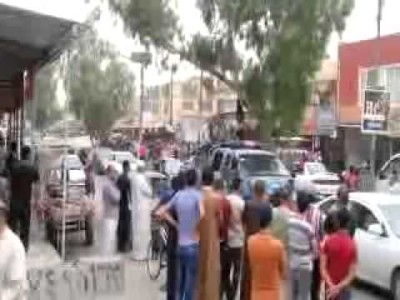The website Niqash offers 1st-hand testimony, via a Special Correspondent, about life in Iraq’s second city Mosul after its capture by insurgents last week:
Just one week after much of the northern Iraqi province of Ninawa was taken over by Sunni Muslim extremists, the around 3 million locals that live there are facing shortages of all kinds.
Since June 18, the provincial capital of Mosul has had no power from outside of the city itself. Many of the city’s inhabitants –– Mosul is home to an estimated 1.5 to 1.8 million and around half of these are said to have fled the city –– say that the government in Baghdad is punishing them for welcoming militants from the Islamic State of Iraq and Syria, or ISIS. In reply, the Ministry of Electricity in Baghdad says that the line carrying power in Baiji, which lies between Mosul and Baghdad, was cut during fighting.
The lack of electricity and the fact that oil-powered generators are not enough to keep all houses and offices supplied means that many families have lost all the food they had stored in their refrigerators. Currently early summer temperatures in Mosul are hovering between 39C (102F) and 42C (108F) on average. Additionally water purification plants have stopped working and drinking water is no longer being pumped into the city.
Line of abandoned vehicles outside closed gasoline station:
A lot of other electrical equipment is no longer working in Mosul either but possibly the most serious lack is being felt in hospitals, where some medical devices cannot be used and where cooling equipment is failing.
Most of the doctors and hospitals in Mosul are still operating but stocks of medicines and other equipment are diminishing; additionally many of the medical specialists have left the city.
All of Mosul’s schools are currently closed; just as this security crisis began, students were supposed to be finishing their school year and doing exams.
People are still going to work –– this is something that ISIS told them to do, announcing the order over mosque loudspeakers. So employees of the government and the provincial authorities are going to work in their various departments –– but of course, they have no idea whether they will be paid. Their salaries come from the central government in Baghdad.
Most affected though are those Mosul locals who do daily work –– that is, they earn a wage every day they work but would otherwise not get paid. Many of these individuals haven’t made any money since the crisis began on June 11.
Agricultural work has also slowed. Local farmers had only just finished harvesting wheat and barley in Ninawa but they are now in a quandary: They have nowhere to store the grain because the grain silos have stopped accepting crops. Additionally there are also large tracts of planted land that have not been able to be harvested because of the lack of fuel to drive to outlying fields.
Another problem for Mosul is the shortage of fuel for vehicles and generators. Basic food items are also running low.
Mosul is suffering under a crippling blockade….It’s extremely difficult to bring goods into the city and most of the merchants have left for fear of being blackmailed by the extremists….
Additionally the road that connects Mosul and Tal Afar with Rabia cannot be used because of ongoing clashes between ISIS and the Iraqi army on one side, and clashes with Iraqi Kurdish forces on the other….
Over the past three days there has been no Internet in Mosul either.

